PRST325: Leadership in Project Management Module Reflection
VerifiedAdded on 2022/10/04
|5
|1446
|113
Report
AI Summary
This report is a reflective analysis of a student's experience in a Leadership in Project Management module (PRST325). The student explores the evolution of their understanding of leadership's role within project management, including the importance of performance management, team building, communication, and strategic management. The reflection covers the key learnings from each week, such as project planning, team development using the Tuckman model, stakeholder management, risk management, and project portfolio management. The student also discusses the application of leadership concepts, including the integration of personality traits and leadership styles, to improve project outcomes. The report concludes with insights into how the course has shaped their perspective on project management methodologies and their strategic importance in modern organizations, emphasizing the need to understand people for effective project management. The assignment also references the course objectives, which include using leadership and management concepts to understand leadership situations and enhance effectiveness in the leadership process. The student also identifies internal and external factors confronting management and key competencies needed to be an effective manager.
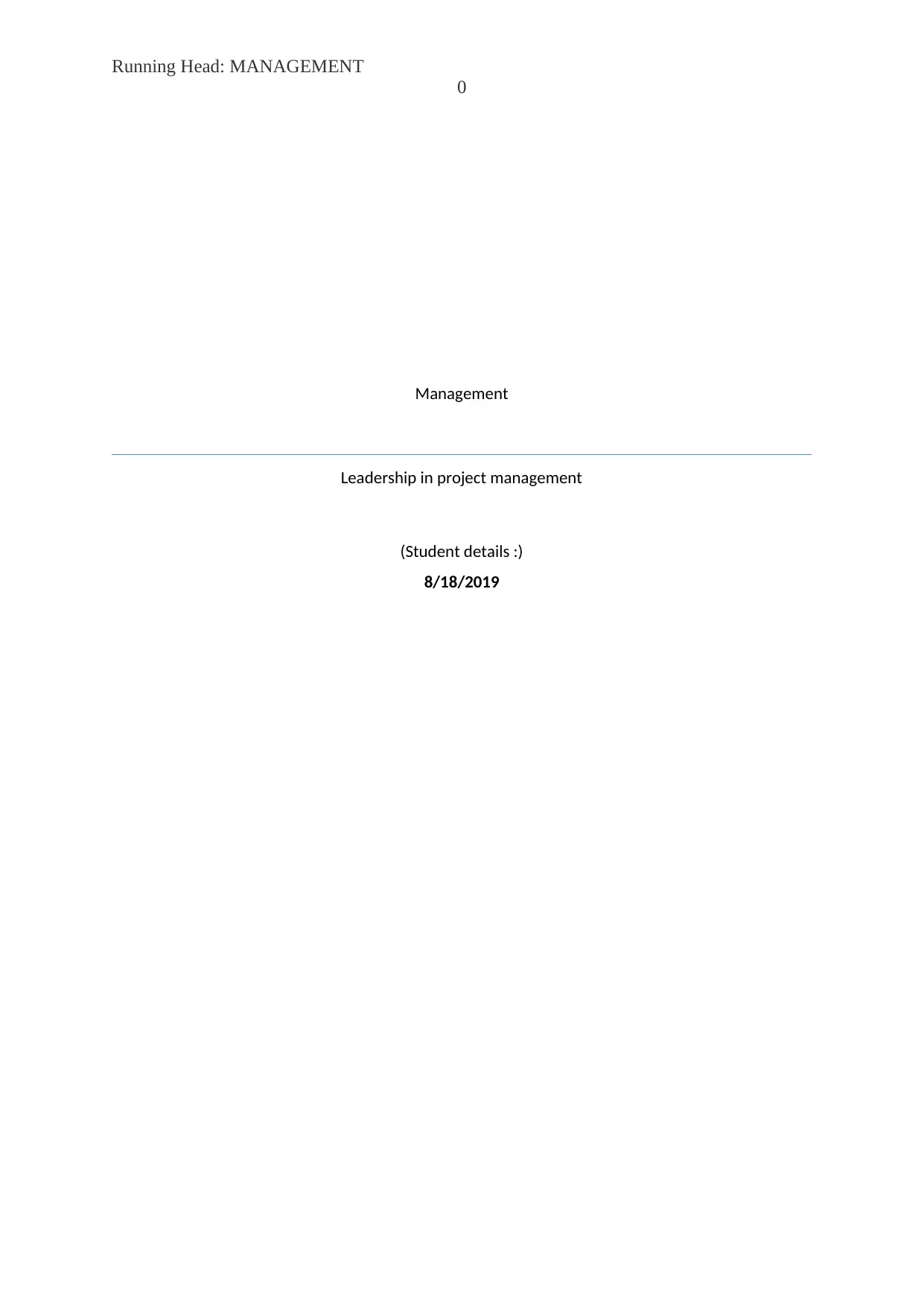
Running Head: MANAGEMENT
0
Management
Leadership in project management
(Student details :)
8/18/2019
0
Management
Leadership in project management
(Student details :)
8/18/2019
Paraphrase This Document
Need a fresh take? Get an instant paraphrase of this document with our AI Paraphraser
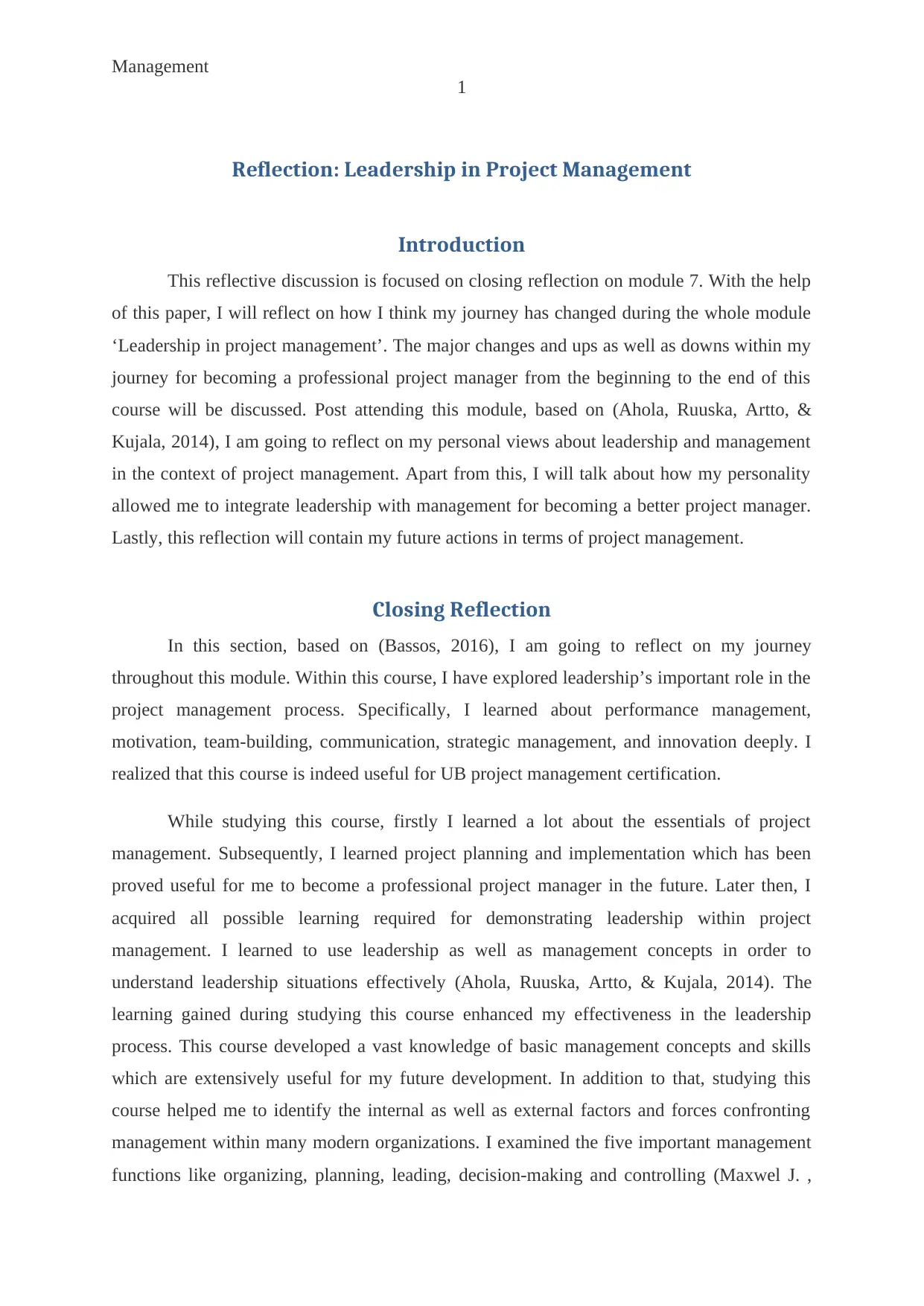
Management
1
Reflection: Leadership in Project Management
Introduction
This reflective discussion is focused on closing reflection on module 7. With the help
of this paper, I will reflect on how I think my journey has changed during the whole module
‘Leadership in project management’. The major changes and ups as well as downs within my
journey for becoming a professional project manager from the beginning to the end of this
course will be discussed. Post attending this module, based on (Ahola, Ruuska, Artto, &
Kujala, 2014), I am going to reflect on my personal views about leadership and management
in the context of project management. Apart from this, I will talk about how my personality
allowed me to integrate leadership with management for becoming a better project manager.
Lastly, this reflection will contain my future actions in terms of project management.
Closing Reflection
In this section, based on (Bassos, 2016), I am going to reflect on my journey
throughout this module. Within this course, I have explored leadership’s important role in the
project management process. Specifically, I learned about performance management,
motivation, team-building, communication, strategic management, and innovation deeply. I
realized that this course is indeed useful for UB project management certification.
While studying this course, firstly I learned a lot about the essentials of project
management. Subsequently, I learned project planning and implementation which has been
proved useful for me to become a professional project manager in the future. Later then, I
acquired all possible learning required for demonstrating leadership within project
management. I learned to use leadership as well as management concepts in order to
understand leadership situations effectively (Ahola, Ruuska, Artto, & Kujala, 2014). The
learning gained during studying this course enhanced my effectiveness in the leadership
process. This course developed a vast knowledge of basic management concepts and skills
which are extensively useful for my future development. In addition to that, studying this
course helped me to identify the internal as well as external factors and forces confronting
management within many modern organizations. I examined the five important management
functions like organizing, planning, leading, decision-making and controlling (Maxwel J. ,
1
Reflection: Leadership in Project Management
Introduction
This reflective discussion is focused on closing reflection on module 7. With the help
of this paper, I will reflect on how I think my journey has changed during the whole module
‘Leadership in project management’. The major changes and ups as well as downs within my
journey for becoming a professional project manager from the beginning to the end of this
course will be discussed. Post attending this module, based on (Ahola, Ruuska, Artto, &
Kujala, 2014), I am going to reflect on my personal views about leadership and management
in the context of project management. Apart from this, I will talk about how my personality
allowed me to integrate leadership with management for becoming a better project manager.
Lastly, this reflection will contain my future actions in terms of project management.
Closing Reflection
In this section, based on (Bassos, 2016), I am going to reflect on my journey
throughout this module. Within this course, I have explored leadership’s important role in the
project management process. Specifically, I learned about performance management,
motivation, team-building, communication, strategic management, and innovation deeply. I
realized that this course is indeed useful for UB project management certification.
While studying this course, firstly I learned a lot about the essentials of project
management. Subsequently, I learned project planning and implementation which has been
proved useful for me to become a professional project manager in the future. Later then, I
acquired all possible learning required for demonstrating leadership within project
management. I learned to use leadership as well as management concepts in order to
understand leadership situations effectively (Ahola, Ruuska, Artto, & Kujala, 2014). The
learning gained during studying this course enhanced my effectiveness in the leadership
process. This course developed a vast knowledge of basic management concepts and skills
which are extensively useful for my future development. In addition to that, studying this
course helped me to identify the internal as well as external factors and forces confronting
management within many modern organizations. I examined the five important management
functions like organizing, planning, leading, decision-making and controlling (Maxwel J. ,
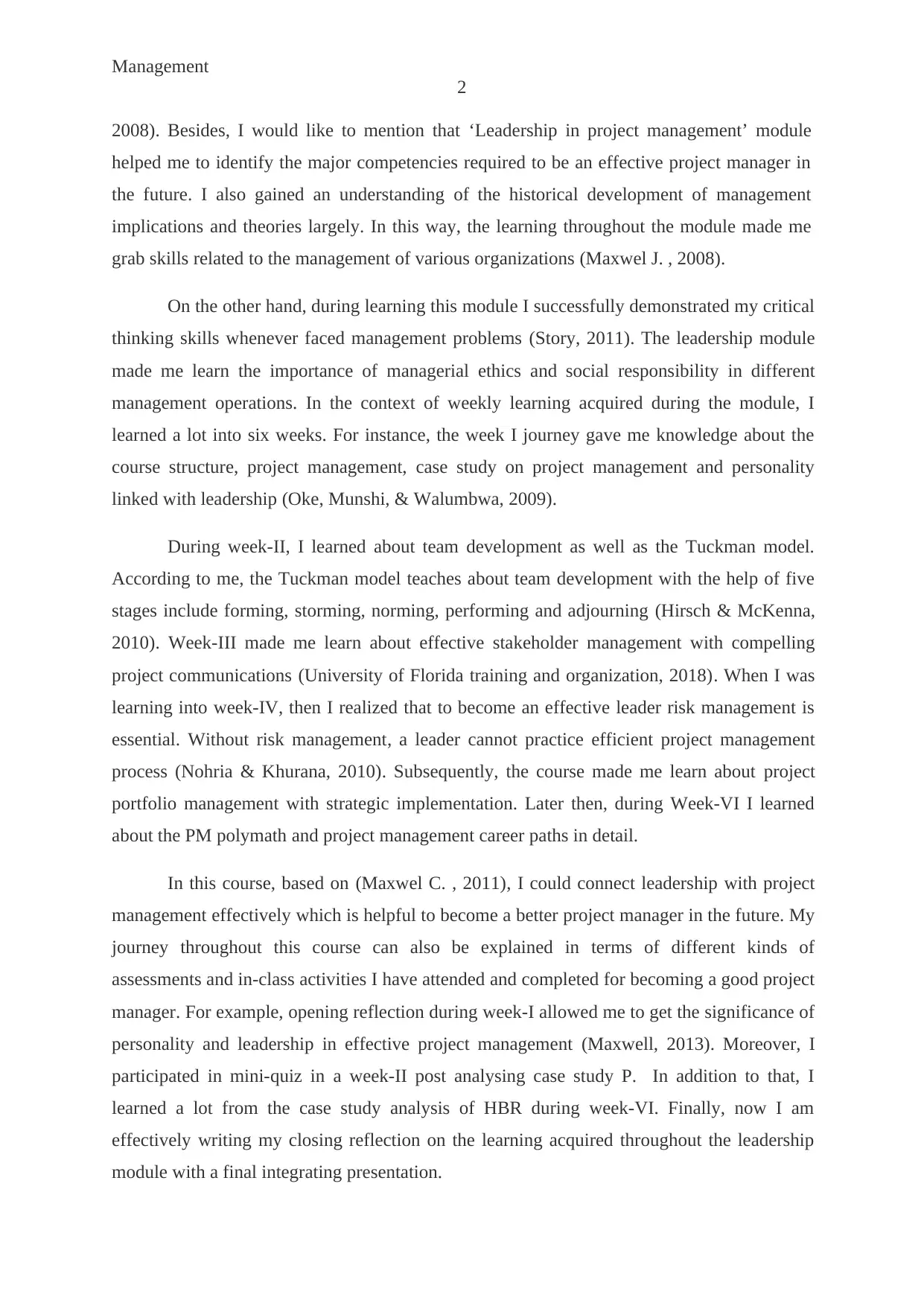
Management
2
2008). Besides, I would like to mention that ‘Leadership in project management’ module
helped me to identify the major competencies required to be an effective project manager in
the future. I also gained an understanding of the historical development of management
implications and theories largely. In this way, the learning throughout the module made me
grab skills related to the management of various organizations (Maxwel J. , 2008).
On the other hand, during learning this module I successfully demonstrated my critical
thinking skills whenever faced management problems (Story, 2011). The leadership module
made me learn the importance of managerial ethics and social responsibility in different
management operations. In the context of weekly learning acquired during the module, I
learned a lot into six weeks. For instance, the week I journey gave me knowledge about the
course structure, project management, case study on project management and personality
linked with leadership (Oke, Munshi, & Walumbwa, 2009).
During week-II, I learned about team development as well as the Tuckman model.
According to me, the Tuckman model teaches about team development with the help of five
stages include forming, storming, norming, performing and adjourning (Hirsch & McKenna,
2010). Week-III made me learn about effective stakeholder management with compelling
project communications (University of Florida training and organization, 2018). When I was
learning into week-IV, then I realized that to become an effective leader risk management is
essential. Without risk management, a leader cannot practice efficient project management
process (Nohria & Khurana, 2010). Subsequently, the course made me learn about project
portfolio management with strategic implementation. Later then, during Week-VI I learned
about the PM polymath and project management career paths in detail.
In this course, based on (Maxwel C. , 2011), I could connect leadership with project
management effectively which is helpful to become a better project manager in the future. My
journey throughout this course can also be explained in terms of different kinds of
assessments and in-class activities I have attended and completed for becoming a good project
manager. For example, opening reflection during week-I allowed me to get the significance of
personality and leadership in effective project management (Maxwell, 2013). Moreover, I
participated in mini-quiz in a week-II post analysing case study P. In addition to that, I
learned a lot from the case study analysis of HBR during week-VI. Finally, now I am
effectively writing my closing reflection on the learning acquired throughout the leadership
module with a final integrating presentation.
2
2008). Besides, I would like to mention that ‘Leadership in project management’ module
helped me to identify the major competencies required to be an effective project manager in
the future. I also gained an understanding of the historical development of management
implications and theories largely. In this way, the learning throughout the module made me
grab skills related to the management of various organizations (Maxwel J. , 2008).
On the other hand, during learning this module I successfully demonstrated my critical
thinking skills whenever faced management problems (Story, 2011). The leadership module
made me learn the importance of managerial ethics and social responsibility in different
management operations. In the context of weekly learning acquired during the module, I
learned a lot into six weeks. For instance, the week I journey gave me knowledge about the
course structure, project management, case study on project management and personality
linked with leadership (Oke, Munshi, & Walumbwa, 2009).
During week-II, I learned about team development as well as the Tuckman model.
According to me, the Tuckman model teaches about team development with the help of five
stages include forming, storming, norming, performing and adjourning (Hirsch & McKenna,
2010). Week-III made me learn about effective stakeholder management with compelling
project communications (University of Florida training and organization, 2018). When I was
learning into week-IV, then I realized that to become an effective leader risk management is
essential. Without risk management, a leader cannot practice efficient project management
process (Nohria & Khurana, 2010). Subsequently, the course made me learn about project
portfolio management with strategic implementation. Later then, during Week-VI I learned
about the PM polymath and project management career paths in detail.
In this course, based on (Maxwel C. , 2011), I could connect leadership with project
management effectively which is helpful to become a better project manager in the future. My
journey throughout this course can also be explained in terms of different kinds of
assessments and in-class activities I have attended and completed for becoming a good project
manager. For example, opening reflection during week-I allowed me to get the significance of
personality and leadership in effective project management (Maxwell, 2013). Moreover, I
participated in mini-quiz in a week-II post analysing case study P. In addition to that, I
learned a lot from the case study analysis of HBR during week-VI. Finally, now I am
effectively writing my closing reflection on the learning acquired throughout the leadership
module with a final integrating presentation.
⊘ This is a preview!⊘
Do you want full access?
Subscribe today to unlock all pages.

Trusted by 1+ million students worldwide
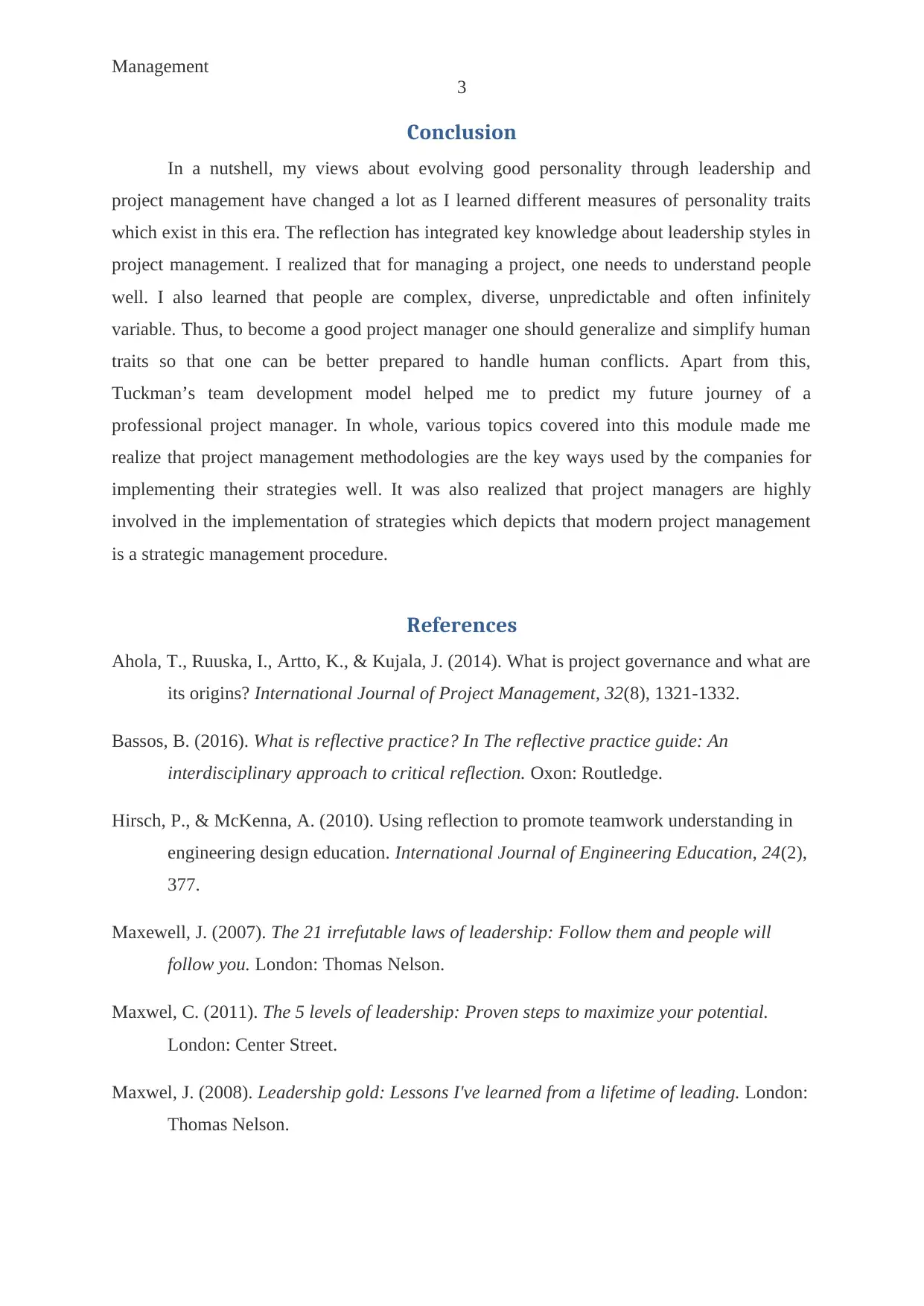
Management
3
Conclusion
In a nutshell, my views about evolving good personality through leadership and
project management have changed a lot as I learned different measures of personality traits
which exist in this era. The reflection has integrated key knowledge about leadership styles in
project management. I realized that for managing a project, one needs to understand people
well. I also learned that people are complex, diverse, unpredictable and often infinitely
variable. Thus, to become a good project manager one should generalize and simplify human
traits so that one can be better prepared to handle human conflicts. Apart from this,
Tuckman’s team development model helped me to predict my future journey of a
professional project manager. In whole, various topics covered into this module made me
realize that project management methodologies are the key ways used by the companies for
implementing their strategies well. It was also realized that project managers are highly
involved in the implementation of strategies which depicts that modern project management
is a strategic management procedure.
References
Ahola, T., Ruuska, I., Artto, K., & Kujala, J. (2014). What is project governance and what are
its origins? International Journal of Project Management, 32(8), 1321-1332.
Bassos, B. (2016). What is reflective practice? In The reflective practice guide: An
interdisciplinary approach to critical reflection. Oxon: Routledge.
Hirsch, P., & McKenna, A. (2010). Using reflection to promote teamwork understanding in
engineering design education. International Journal of Engineering Education, 24(2),
377.
Maxewell, J. (2007). The 21 irrefutable laws of leadership: Follow them and people will
follow you. London: Thomas Nelson.
Maxwel, C. (2011). The 5 levels of leadership: Proven steps to maximize your potential.
London: Center Street.
Maxwel, J. (2008). Leadership gold: Lessons I've learned from a lifetime of leading. London:
Thomas Nelson.
3
Conclusion
In a nutshell, my views about evolving good personality through leadership and
project management have changed a lot as I learned different measures of personality traits
which exist in this era. The reflection has integrated key knowledge about leadership styles in
project management. I realized that for managing a project, one needs to understand people
well. I also learned that people are complex, diverse, unpredictable and often infinitely
variable. Thus, to become a good project manager one should generalize and simplify human
traits so that one can be better prepared to handle human conflicts. Apart from this,
Tuckman’s team development model helped me to predict my future journey of a
professional project manager. In whole, various topics covered into this module made me
realize that project management methodologies are the key ways used by the companies for
implementing their strategies well. It was also realized that project managers are highly
involved in the implementation of strategies which depicts that modern project management
is a strategic management procedure.
References
Ahola, T., Ruuska, I., Artto, K., & Kujala, J. (2014). What is project governance and what are
its origins? International Journal of Project Management, 32(8), 1321-1332.
Bassos, B. (2016). What is reflective practice? In The reflective practice guide: An
interdisciplinary approach to critical reflection. Oxon: Routledge.
Hirsch, P., & McKenna, A. (2010). Using reflection to promote teamwork understanding in
engineering design education. International Journal of Engineering Education, 24(2),
377.
Maxewell, J. (2007). The 21 irrefutable laws of leadership: Follow them and people will
follow you. London: Thomas Nelson.
Maxwel, C. (2011). The 5 levels of leadership: Proven steps to maximize your potential.
London: Center Street.
Maxwel, J. (2008). Leadership gold: Lessons I've learned from a lifetime of leading. London:
Thomas Nelson.
Paraphrase This Document
Need a fresh take? Get an instant paraphrase of this document with our AI Paraphraser
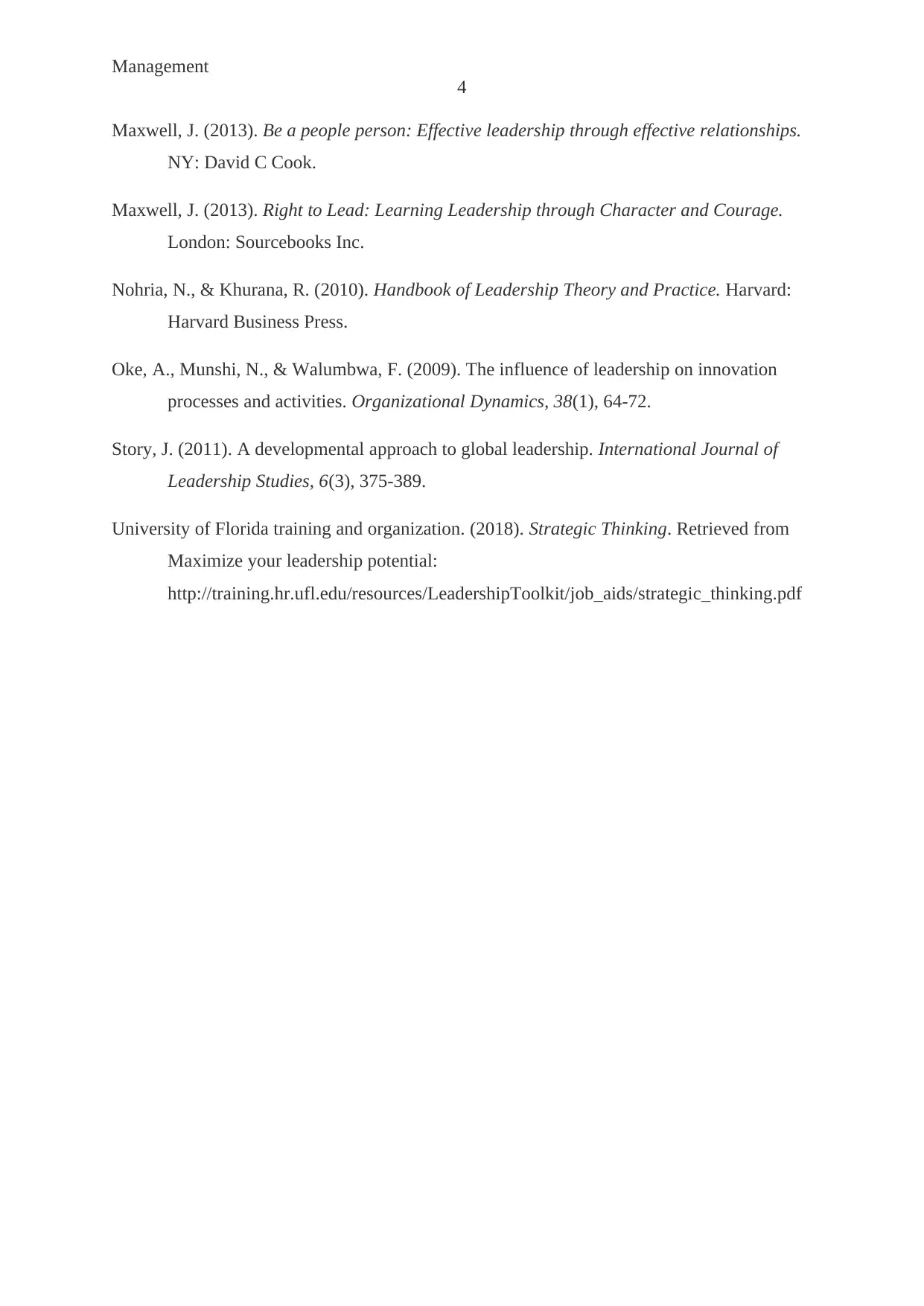
Management
4
Maxwell, J. (2013). Be a people person: Effective leadership through effective relationships.
NY: David C Cook.
Maxwell, J. (2013). Right to Lead: Learning Leadership through Character and Courage.
London: Sourcebooks Inc.
Nohria, N., & Khurana, R. (2010). Handbook of Leadership Theory and Practice. Harvard:
Harvard Business Press.
Oke, A., Munshi, N., & Walumbwa, F. (2009). The influence of leadership on innovation
processes and activities. Organizational Dynamics, 38(1), 64-72.
Story, J. (2011). A developmental approach to global leadership. International Journal of
Leadership Studies, 6(3), 375-389.
University of Florida training and organization. (2018). Strategic Thinking. Retrieved from
Maximize your leadership potential:
http://training.hr.ufl.edu/resources/LeadershipToolkit/job_aids/strategic_thinking.pdf
4
Maxwell, J. (2013). Be a people person: Effective leadership through effective relationships.
NY: David C Cook.
Maxwell, J. (2013). Right to Lead: Learning Leadership through Character and Courage.
London: Sourcebooks Inc.
Nohria, N., & Khurana, R. (2010). Handbook of Leadership Theory and Practice. Harvard:
Harvard Business Press.
Oke, A., Munshi, N., & Walumbwa, F. (2009). The influence of leadership on innovation
processes and activities. Organizational Dynamics, 38(1), 64-72.
Story, J. (2011). A developmental approach to global leadership. International Journal of
Leadership Studies, 6(3), 375-389.
University of Florida training and organization. (2018). Strategic Thinking. Retrieved from
Maximize your leadership potential:
http://training.hr.ufl.edu/resources/LeadershipToolkit/job_aids/strategic_thinking.pdf
1 out of 5
Related Documents
Your All-in-One AI-Powered Toolkit for Academic Success.
+13062052269
info@desklib.com
Available 24*7 on WhatsApp / Email
![[object Object]](/_next/static/media/star-bottom.7253800d.svg)
Unlock your academic potential
Copyright © 2020–2025 A2Z Services. All Rights Reserved. Developed and managed by ZUCOL.





